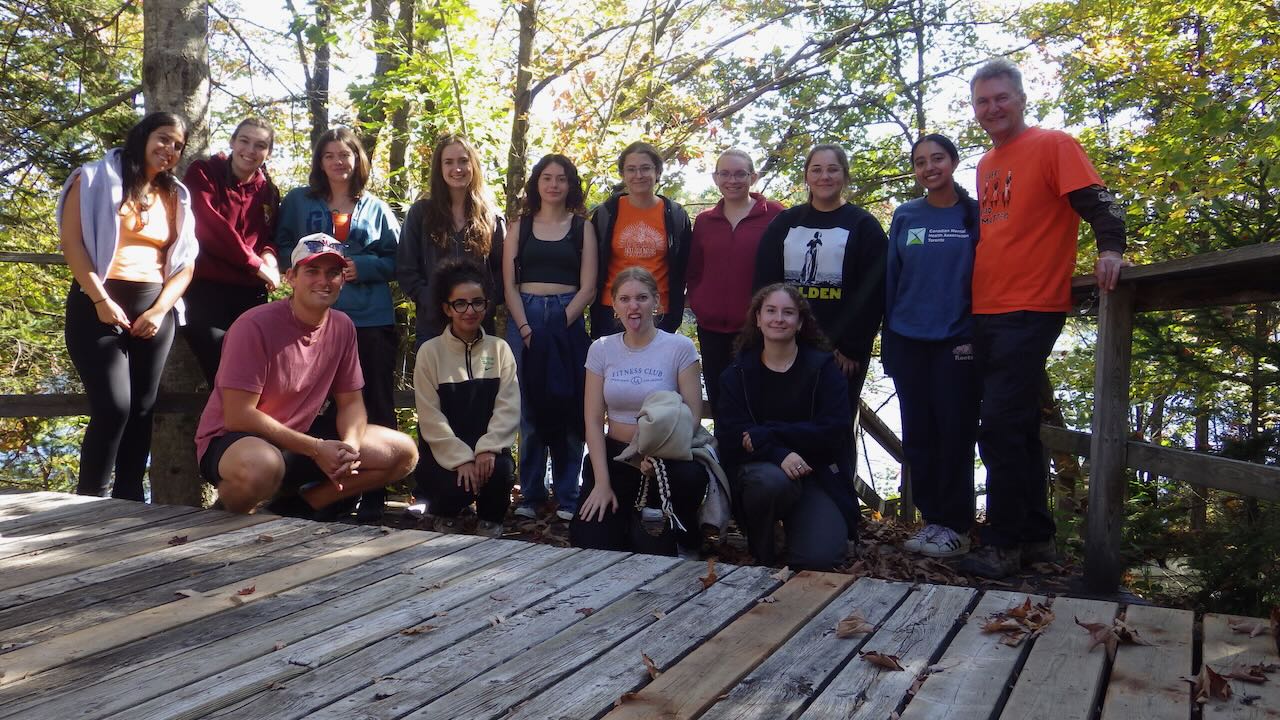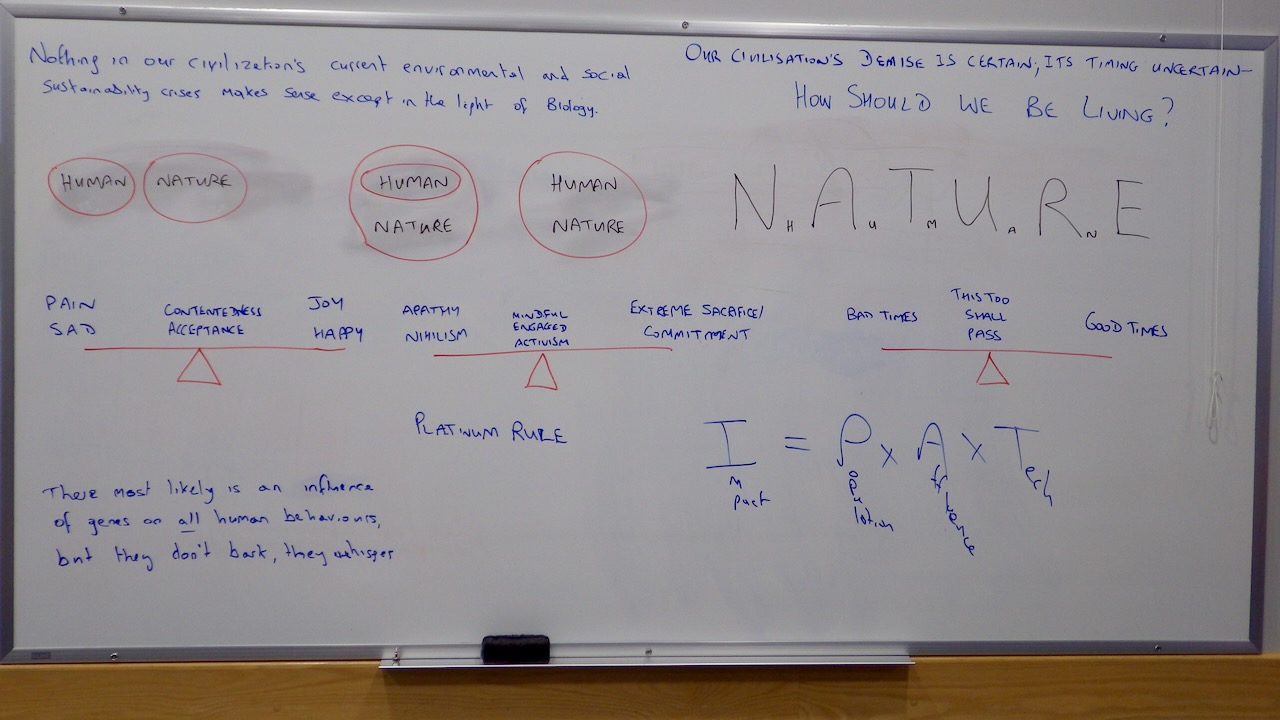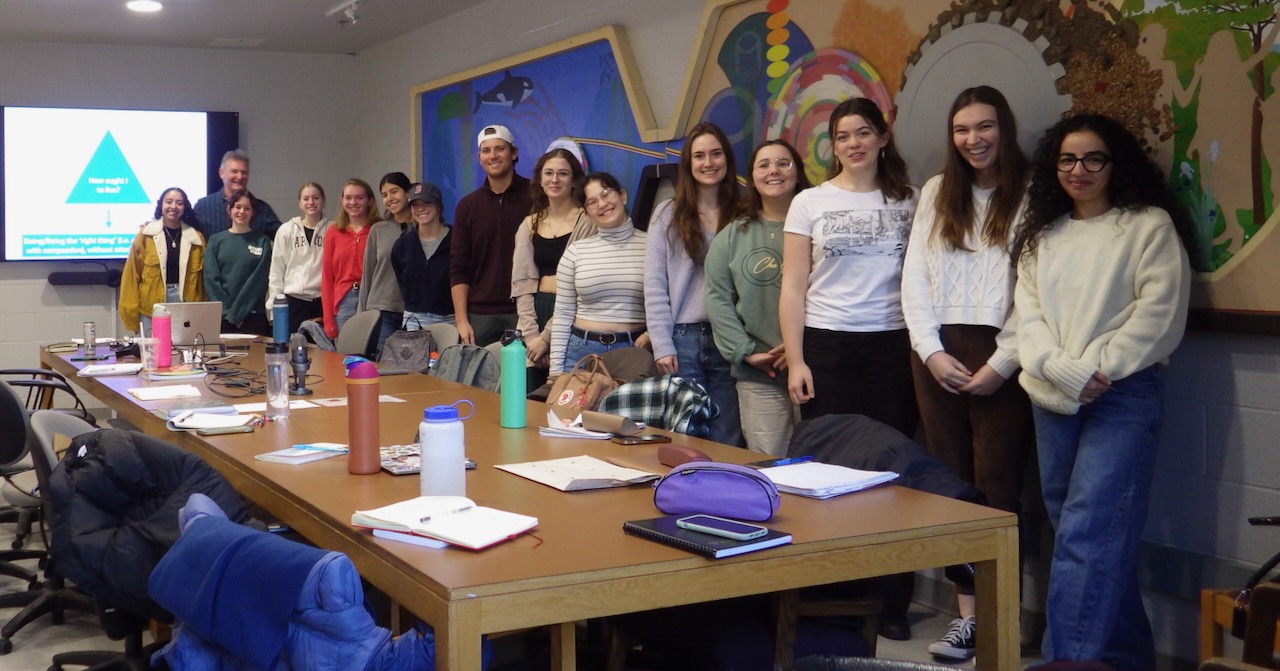Welcome to the BIOL 510 webpage for the Fall 2024 iteration of the course!
This ecology course is aimed at identifying and critiquing potential mechanisms by which our civilization could most effectively move toward more sustainable living. Biology can explain current environmental sustainability issues, but is also at the fundamental root of their underlying causes – human behaviour. Therefore, the biology of sustainability incorporates biogeochemical, ecological, economic, social, genetic, and philosophical features and constraints. Each iteration of the course will focus on a unique specific thematic question related to at least some of those components.
The principal question that the 2024 course will address is: Our civilisation's demise is certain; its timing uncertain. How should we be living?
This course is for final year undergraduates and is specifically aimed at enhancing their capacities for critical thinking, intelligent open discussion, group work, and independent learning. Emphasis will be on interactive discussions and student-led seminars in which participants will have ample opportunities to explore, analyze and synthesize scientific information, to learn how the scientific process works, to speak and write effectively, and to develop their understanding of the philosophies underlying human behaviour and how they relate to global change issues, and the sustainability of our current civilisation. Students will lead informal seminar discussions on some component of this theme that is of particular interest to them.
The 2024 iteration of this course will be largely focussed on reading and discussion of biology professor David Barash's 2014 book Buddhist Biology. Ancient Eastern Wisdom meets Modern Western Science, but will also include a North American Indigenous component including associated readings and possibly an activity exercise/workshop.
Learning outcomes:
By the end of this course, the student should be able to:
- Critically assess the constraints (ecological, economic, social, behavioural and political) that underlie society’s current responses to global change issues
- Discuss, explain, and critique the similarities and differences between contemporary Buddhism and Indigenous cultures in fundamental philosophical concepts that relate to Biology and Sustainability such as interconnectedness and impermanence
- Formulate clear, original, challenging, and concise thematic questions from study reading material that are likely to lead to focussed and intellectually probing seminar group discussions, student-led seminar topics, or short synthesis essay/media project
- Lead a stimulating, informative, and creative seminar interpreting selected material from Barash’s book Buddhist Biology in the context of this course’s focal question (see above)
- Develop and present a cohesive, original, synthesis final essay/media project on the potential value of incorporating contemporary Buddhist and Indigenous philosophical perspectives on interconnectedness and impermanence to promote more sustainable living across our society
- Use the learning achieved in this course to develop lasting personal solutions for coping with, and constructively responding to, the major environmental and social sustainability issues of the 21st century
Professor: Paul Grogan
Seminar times: Wednesdays 13.00; Fridays 11.30
Location: Room 3112 Biosciences building
Calendar: Sessions are 1.5 hours
Assessment:
15% Active participation in discussions (questions, comments, suggestions)
20% Seminar written questions
30% Seminar
35% Final synthesis exercise (10% outline; 25% final submission)
Schedule:
|
Date |
Topic |
Convenor |
Reading |
|
September 4th |
Course introduction, and Personal Land Acknowledgement |
Paul |
|
|
September 6th |
Sustainability: What can Biology tell us about our future, and how ought we to live? (I)
|
Paul |
Grogan, P. 2013. Our Anthropocene Future - What can Biology tell us? Free Inquiry. February/March issue. Vol. 32(2):16-19. |
|
September 11th |
Sustainability: What can Biology tell us about our future, and how ought we to live? (II) |
Paul |
|
|
September 13th |
Surviving Progress (Documentary film); What can Biology tell us about our future, and how ought we to live? (III) |
Paul |
Discussion of Surviving Progress (Documentary film)
|
|
September 18th |
Introduction to Indigenous Ways of Knowing |
|
Webinar recordings: What does the Earth ask of Us? Dr. Robin Wall Kimmerer (Nov. 12th, 2020)
|
|
September 20th |
Introduction to Seminar Guidelines |
|
Rethinking our Science: Blackfoot Metaphysics Waiting in the Wings. Reflections by a Blackfoot. Dr. Leroy Little Bear (April 20, 2021)
Mazzocchi, F. 2020. A deeper meaning of sustainability: Insights from Indigenous Knowledge. Anthropocene Review 7(1): 77-93
Seminar planning discussion |
|
September 25th |
No class (Paul away). Reading and Seminar preparation time |
|
|
|
September 27th |
Help or Hinder? Is there a useful role for aspects of religion in coping with our civilization's demise? |
Emma Mitchell |
Barash Chapter 1
|
|
September 30th |
Optional field trip – Nature Walk focusing on enhancing student awareness of interconnection and impermanence, and in recognition of National Day for Indigenous Truth and Reconciliation. QUBS Elbow Lake Environmental Education Centre
|
Paul |
This will be a morning trip so that we can all be back at Queen’s in time for the Sacred Fire ceremony beginning at 1.15 pm to join together to reflect on the harm brought to Indigenous Peoples by the residential school system. This is also a time to understand our collective role in advancing Truth and Reconciliation, not just at Queen’s, but across Canada. |
|
October 2nd |
Given that impermanence drives our desires, how is choosing to pass on our genes an act of selfishness? |
Chloe Lightfoot |
Chapter 2a (-midway p44). |
|
October 4th |
How might detaching from ourselves be the best way to become our best selves? |
Hannah Pentz |
Chapter 2b. |
|
October 9th |
Given that everything we experience is inevitably and constantly undergoing change, how should we approach achieving individual as well as planetary homeostasis? |
Chris Ponikvar |
Chapter 3a (- last para p70). |
|
October 11th |
How have Western patriarchal beliefs of man’s permanence and centrality to the universe contributed to our current climate crisis, and how might embracing long suppressed women’s perspectives help us to navigate our true place in the world? |
Anna Pasila |
Chapter 3b. |
|
October 16th |
Reading week break |
|
|
|
October 18th |
Reading week break |
|
|
|
October 23rd |
Living more sustainably: How can embracing interconnectedness contribute to the way we should think and act? |
Erika Gagnon |
Chapter 4a (-midway p. 96). |
|
October 25th |
How would integrating secular Buddhist perspectives on interconnectedness provide new motivation for tackling the climate change problem? |
Hannah Moy |
Chapter 4b. |
|
October 30th |
How can Indigenous perspectives of gratitude, reciprocity, and stewardship influence the way we think and interact with the world around us? |
Kaiya Mongrain |
Kealiikanakaoleohaililani and Giardina. 2016. Embracing the sacred: an indigenous framework for tomorrow’s sustainability science. Sustainability Science 11:57–67
Video: Bob Randall - The Land Owns Us by the Global Diversity Project |
|
November 1st |
Sometimes, when trying to help, we do more harm than good. Are our attempts at fixing the environmental crisis making things worse? |
Rachael Brown |
Chapter 5a (-midway p123). |
|
November 6th |
My modern-day Dukkha: How can I integrate deeper, more authentic perspectives on sustainability into my employer’s corporate practices to make sure that I don’t feel like a fraud? |
Harnaaz Sandhu |
Chapter 5b. |
|
November 8th |
How does our understanding of karma challenge or reinforce the idea of individual versus collective responsibility in addressing environmental issues? |
Danielle De Souza |
Chapter 6a (-top of p145). |
|
November 13th |
Can our knowledge of karma empower us to break cycles of unsustainable habits?
|
Claire Matthews |
Chapter 6b. |
|
November 15th |
Does our human nature doom us to extinction?
|
Jasmine Coady |
Chapter 7a (-top of p171).
|
|
November 20th |
If our big brain’s intelligence and reason got us into the current sustainability crisis, how can our big brain’s desire for finding meaning to our existence help us navigate our way out? |
Sarah Oziel |
Chapter 7b. |
|
November 22nd |
What does ‘our relationship with the land’ mean, and why is fostering it a critical step toward making us better advocates for sustainability? |
Amanda Leonardis |
Sheremeta, M. 2018. Listening to relational values in the era of rapid environmental change in the Inuit Nunangat. Current Opinion in Environmental Sustainability 35:75-81. |
|
November 27th |
Synthesis I
|
Paul |
|
|
November 29th |
What can Biology tell us about our future, and how ought we to live? (final synthesis)
|
Paul |
|



Last Updated: 15 January, 2025
To see materials from previous iterations of this course, use the drop-down menu under the 'Teaching' tab at the top of this page
